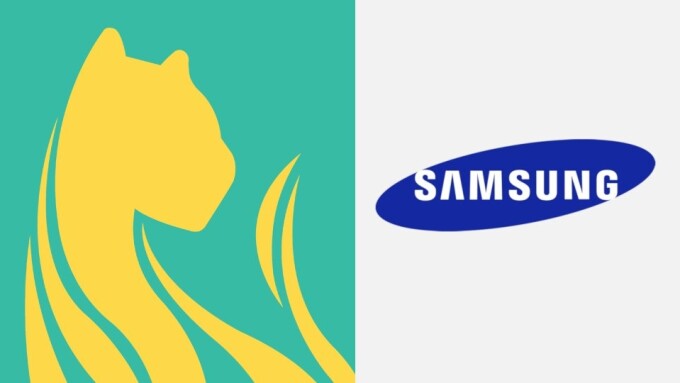SAN FRANCISCO — After Lora DiCarlo's triumphant win over sexism at CES this year, a new world order that welcomed sextech to the club seemed to be on the rise.
However, progress took a step backwards this past Thursday at a SF Women in Tech event sponsored by Samsung at which Liz Klinger, co-founder and CEO of Lioness, a sextech company whose flagship smart vibrator can track and analyze orgasms, was asked to remove her product from display and pack up her booth.
"In some ways it's surprising," Klinger told XBIZ, "but, at the same time, it's not [unexpected] given the ongoing conversation with some of these big companies surrounding sexuality."
The event in question, "Growth and Innovation in the Wearables Device Market," was attended by representatives of the Samsung Business Development team and was reportedly an extension of their ongoing efforts to attract app developers for their watches.
I am at the @Samsung event with #womenintechSF for @LionessHealth and was just asked to take down my table. Was approved beforehand, one person was not ok with it because it’s women’s *sexual* health.
— Liz Klinger (@ThisIsKlinger) August 23, 2019
This is not ok.@cindygallop @womenofsextech #femtech #sextech
The event was apparently intended to center on "femtech," a rapidly growing market segment that focuses on women's health.
Women's Health According to Samsung
How and why Samsung pulled the plug on Klinger's Lioness Vibrator is a classic example of corporate bigotry, which sextech brands continue to face regarding the access, or lack thereof, they're granted for promoting and marketing their products.
As evidenced by Dame Products and their pending lawsuit against New York's MTA, controversy that surrounds sextech is fraught with gender bias and a general discomfort to openly discuss and display anything that has to do with women's sexuality.
Nicole Dahlstrom, founder and CEO of the FemTech Collective, said she has been in contact with Samsung reps since March regarding the "Growth and Wearables" event. After being invited to take part in the opening panel discussion on wearable tech in healthcare, Samsung additionally asked her to recommend companies for an adjoining startup pavilion.
Dahlstrom suggested five companies, including Lioness, all of which were approved by Samsung on August 13.
According to Klinger, she was asked to take down her booth just prior to the start of the opening panel, with no further reason given other than "someone higher up was not okay with it."
Klinger waited for nearly four hours to speak to someone "higher-up"; eventually, an individual became available when the event was drawing to a close.
"I wanted to know who [it was] that said 'no,'" she said. "I wanted to know the rationale because it could have been a relevant reason. I felt pretty disempowered because some shadowy figure was just pulling the rug out. It's like someone was hiding something and it didn't feel right."
The Lioness Vibrator uses precision sensors and biofeedback to create visual representations of users' orgasms. Besides encouraging women to explore their sexuality, Lioness is also conducting research that marks a significant push in attempting to quantify and understand pleasure.
A Samsung rep finally told Klinger that her product "isn't women's health — at all."
"I shouldn't have to talk about why sexual health is related to women's health," Klinger responded. "But barring that, we do a lot of work in terms of research around sexual function and sexuality and use a lot of that data in novel ways that are opening up different possibilities for understanding how pleasure and health are interrelated."
It's a conversation remarkably similar to the one between Lora DiCarlo and the Consumer Technology Association, the organizational body of CES, in which the sextech startup was essentially forced to prove that their personal massager Osé, which uses patented biomimicry technology developed in collaboration with the Oregon State University Robotics Engineering Lab to deliver blended orgasms, is, in fact, a robot and thus eligible for consideration in Robotics and Drones category of the show.
Upon being presented with Klinger's argument, the Samsung rep replied, "Well, it's not a wearable so you still shouldn't be here."
A Seat at the Table
Lioness' unceremonious ouster will likely not be the last time a female-focused sextech brand will experience unnecessary scrutiny.
"This has happened so many times," said Klinger. "I'm tired of having the lip service of [companies] supporting women in tech when stuff like this happens. They knew who we were, they knew what we do — it was just so incredibly frustrating and disappointing to see a company handle this so unprofessionally, especially for an event that's supposed to be for women in tech with a focus on women's health."
Notably, aside from Dahlstrom, the only other panelist that was not a Samsung employee is Jennifer Tye, COO of Glow Inc., a fertility tracking app, suggesting a concerning double-standard in what Samsung deems to be appropriately related to "women's health."
Following the debacle, Klinger says she has heard nothing from the tech giant.
"Ideally, it'd be great to see companies think about how sexual health and wellness plays a role in their consumers' live," she said. "Sex isn't this dark thing you have to keep hidden away in a corner somewhere. We're seeing more and more people taking notice — like with Lora DiCarlo and Dame Products — but despite all the news, I don't think [changes] have percolated in a broad way. My hope is that by having more of these examples come to light, maybe then some of these companies will start doing something about it."
"Also," she concluded, "an apology would be nice."








